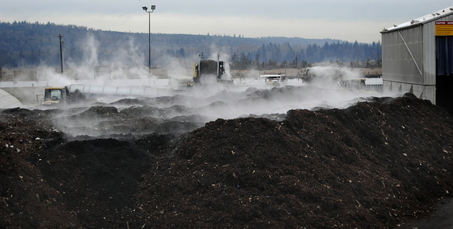
By KIRK BOXLEITNER
Marysville Globe Reporter
JULY 24, 2013 · 10:03 AM
EVERETT — Another summer marks another set of complaints about the odors allegedly emanating from Cedar Grove Composting’s Smith Island facility, which was cited for two odor violations on June 6 and another two on June 25 by the Puget Sound Clean Air Agency.
PSCAA spokesperson Joanne Todd explained that this makes 13 citations in the past five years for Cedar Grove at Smith Island, in addition to four written warnings within that time, although she also noted that the Smith Island composting plant had not received any citations for 2013 until the month of June.
Susan Thoman, director of public affairs for Cedar Grove, added that these PSCAA notices of violation were the first for the Smith Island plant in three years, and reported that their on-site electronic odor monitoring data for June 6 “clearly contradicts” the PSCAA’s findings, by showing no detectable odors leaving the plant during the times cited by those notices.
“We understand the community’s frustrations, and we care deeply about talking to people about them,” Thoman said. “We’ve begun a review of these findings and our data with Puget Sound Clean Air Agency officials, to try and resolve any disagreements.”
As of Monday, July 22, Cedar Grove had yet to receive the two PSCAA violation notices for June 25, and thus, Thoman declined to comment upon them specifically.
Todd acknowledged that Cedar Grove might not necessarily be subject to disciplinary action as a result of the PSCAA notices, especially since the company can choose to appeal them, but she also clarified that the odor complaints are independent from the agency’s ongoing odor study employing “e-noses” from Odotech similar to those already installed by Cedar Grove at Smith Island.
“With complaints, the public calls in bad odors, and our inspectors work to trace those smells back from those residences to their sources,” Todd said. “The Odotech e-noses have nothing to do with those notices of violation. Cedar Grove owns their own e-noses, and we’ve installed a number of e-noses in other locations to help scientifically identify the source of the odor that so many people in Marysville and North Everett have smelled, but we’re not using them for compliance.”
Todd elaborated that the data from those 10 e-noses will be combined with observations from trained area residents, meteorological factors and other information after the study wraps up, which Todd expects will occur around November of this year.
“It’s going to give us a ton of data, which will take a lot longer than a month to go through,” Todd said.
In the meantime, Thoman relayed the number of positive comments she’s received from the community about Cedar Grove’s composting work, while urging the public to consider the other potential sources of the odor, and Marysville Mayor Jon Nehring reiterated his concerns about the PSCAA study.
“We were always opposed to the e-noses,” Nehring said. “Cedar Grove had a contract with Odotech before the study started, so we believed they would be a bit biased, and our Public Works Director Kevin Nielsen pointed out that the e-noses are not qualified to deal with compost because they can only pick up very defined odors. We don’t have any illusions that the e-noses will say that Cedar Grove is the culprit behind the odor, but without even saying for certain where the odor is coming from, we just want it to away, and we think Cedar Grove could help out with that.”

